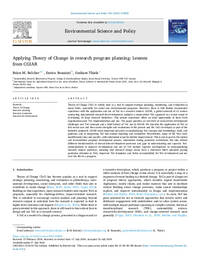Applying Theory of Change in research program planning: Lessons from CGIAR

Authors:
Theory of Change (ToC) is widely used as a tool to support strategic planning, monitoring, and evaluation in many fields, especially for social and environmental programs. However, there is still limited documented experience with the application and use of ToC in a research context. CGIAR, a global network of 15 centers conducting international research-for-development, included a standardized ToC approach in a recent round of developing 32 large research Initiatives. This unique experience offers an ideal opportunity to learn from organization-scale ToC implementation and use. The paper provides an overview of research-for-development challenges and ToC concepts and a brief history of ToC use in CGIAR. We describe the application of ToC in this recent case and then assess strengths and weaknesses of the process and the ToCs developed as part of the Initiative proposals. CGIAR made important advances in standardizing ToC concepts and terminology, tools, and guidance, and in integrating ToC into annual reporting and evaluation. Nevertheless, many of the ToCs were insufficiently clear and specific, with substantial scope for further improvement. This is due in part to the rushed and decentralized proposal development process, undertaken during pandemic restrictions, but also reflects different mental-models of research-for-development processes and gaps in understanding and capacity. Recommendations to improve development and use of ToC include capacity development in conceptualizing research impact pathways, ensuring that research design teams have a dedicated M&E specialist paying particular attention to ToCs, improved ToC templates, and better accountability for ToC development and use over the life of a program.
